Posted by Deborah Huso on Dec 9, 2013 in
Motherhood,
Mothers and Daughters,
Relationships Not everyone within my sphere of influence agrees with how I raise my daughter. I’ll admit, there are things about my parenting that look a little risky. Not the least of which is the way I don’t protect her from the realities of life.
For example, I cry in front of her. I have done this since she was very small. Thus, she has come to see tears as a natural expression of sadness, which like any human emotion, is a temporary state. And she knows instinctively, so it appears at times, what to do with another person’s sadness….
“Mommy, why are you sad? Who has been mean to you?”
And I will explain in the best terms I can for a six-year-old to grasp. And Heidi will put her soft little arms around my neck, plant my cheeks with kisses, and say perfectly reasonable and comforting things like, “Sometimes life is complicated, but it will be okay. I will always love you and be here for you.”
Profound yet so simple.
I asked my friend, Bill, the father of three, how my daughter knows to say these things that adults are so often incapable of saying, “Children are pure and untainted,” he says. “Honesty and sincerity come naturally to them.”
And then life breeds it out of them. Sometimes parents do, too. I know my parents did. Their efforts were well-meaning. They thought they were doing the right thing, both in protecting me from their adult troubles and in teaching me to protect myself from letting others see me.
But the thing is—kids have emotional intuition on a scale that most adults do not. No one has to tell them that Mommy and Daddy are worried about how to pay all their bills or that Mommy and Daddy don’t love each other anymore. They may not know what is wrong, but they know something is. And then they act out and fret themselves silly the way children who are afraid and uncertain will do—maybe they will misbehave at school; maybe their grades will plummet; maybe they will have anxiety attacks.
My parents never fooled me. And their efforts to protect me often had the opposite effect. I tried to fix complicated things that were broken. When Dad didn’t give Mom a Mother’s Day gift one year, and I saw how upset she was by it, I changed the card on the rhododendron I had given her to read Dad’s name instead of my own. I figured it was much more hurtful to her to be neglected by my father than by a little girl. She saw through my ruse, of course.
And then when I couldn’t figure out how to fix the things I didn’t understand because no one was explaining them to me, I would cry…only to be confronted with admonitions from both my parents to quell my tears, not to alert the world I was vulnerable.
Trust no one, my parents words and actions told me. Rely on yourself. Keep your true feelings to yourself. Don’t let anyone know they are getting to you. Then they hold power over you.
I do not resent my parents for any of this. They did the best they knew how. They raised me as they had been raised. Granted, it took me nearly 20 years to train myself out of that mode of thinking, to be fearlessly who I am before the world, to let people in even at the risk of great pain, to both give and receive love and solace openly.
Honesty and sincerity still work in this world…if both sides are willing to offer them up.
When I’ve had a rough day, and I snap at my daughter for being too chatty and asking too many questions of my exhausted brain, she will frown, look me in the eye and say, “It hurts my feelings when you yell at me.”
How many adults would do this? Most would walk away, resentful, and give me the silent treatment for the rest of the day for wounding them.
Not Heidi. No way is she going to let anger fester.
And I recognize what I have taught her—honesty, straightforwardness no matter what.
“I’m sorry,” I say. “I’ve had a stressful day. I did not mean to yell at you.” And I kiss her on the forehead. She is satisfied. Everything is as it was two minutes before.
Heidi knows people get over shit.
If they allow themselves to….
But hardened adults that we are, wounded by life, torn asunder by love gone wrong, protective of what little hope we have left, carry our resentments, our anger, our pain under lock and key, where it festers and corrodes, slowly destroying any chance we have left of unfettered joy—the joy of being who we are and letting others love us for it.
Heidi knows, even at the tender age of 6, what pain and trouble look like. She has seen her parents divorce. She has seen her mother hurt. She has seen elderly relatives sick and fading, slowly losing their minds. She comes home from school some days and tells me plainly about a boy who pushed her on the playground or a girl who called her a mean name and asks my advice. I tell her, “Keep your distance from people who hurt you. Surround yourself with good people, people who make you feel good about yourself.”
I did not come to this wisdom easily. I have learned it from long and difficult experience and from deeply kind and loving friends like Bill, whom I’ve known since childhood. When I commented that openness and honesty, though I strive for them, often leave me in the lurch when it comes to human relationships, that too many people seem to find those qualities threatening, he remarked, “Be true to yourself, and you will draw good people to you. Don’t waste your time on people who can’t take you exactly as you are.”
It was the same advice I had given to Heidi hours before, just spoken a little bit differently.
May my daughter remember it always, even once she is gone from me, that she may not waste time, as I too often have, on people who are afraid of themselves and, therefore, afraid of her.
Posted by Mollie Bryan on Nov 19, 2013 in
Men,
Motherhood,
Mothers and Daughters,
Relationships 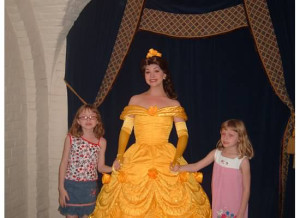
My daughters with Princess Belle
When my daughters were small, we’d play the princess game. I’d make up little quizzes about each Disney princess and they would guess which princess belonged with which trait. I also played this game with Goddesses—but that’s another story.
I always told them that Belle from Disney’s “Beauty and the Beast” was my favorite for two reasons—she loves books and she sees the beast for who he really is. And hey, it worked out for Belle, didn’t it?
I think a lot about myth, story, and fairytale. My girls and I never miss an episode of “Once Upon A Time,” which is a modern-day mash-up of fairy tales. I also loved the “Beauty and the Beast” show that was popular in the 1980s. The “beast” lives beneath the streets of New York City in this fabulous underground space full of books and antiques. So romantic. He was another beast that had that softness underneath him.
I love that kind of man—sort of rough and bristly on the outside, but a real sweetheart underneath. Part of the deliciousness of a relationship with this kind of man is that very few people know him like you do. My own husband is kind of like this. There’s something about a man who is confident, in-charge, and knows what he wants—and feels good about taking it.
But the danger in falling for a beast type, of course, is that sometimes a beast is just a beast.
Which leads to the arduous trial of trying to separate the real beasts from the crusty on the outside but soft on the inside ones.
So much of that can mean years of sorting through our own personal mythologies where we tell ourselves things like “boys will be boys,” (or Goddess forbid) “If I give him one more chance, I know he won’t drink/cheat/hit me again.” These are the kinds of beasts that deserve no second glimpses. Maybe someday he will change, but probably not, and who has time for that crap?
Move on, sister.
On the other hand, a cool part of the story is that Belle overlooks the beast’s horrific face to see him for who he is. And this is a great lesson. I can point out several men that I’ve been attracted to immediately; then they start talking and reveal they are sexist or stupid, and suddenly the attraction is gone. I’ve had it work the other way, too, where an attraction grows as I get to know someone. This is definitely, for me, the best way.
So as the mother of two daughters who love story, I use the “Beauty and the Beast” story sometimes in my parenting. My oldest daughter is almost fifteen, and she flits from crush to crush and boy to boy. But every once in awhile, a boy comes along that she falls hard for—and most of the time, he’s more of the “beast” variety.
For example, her current crush is a high school senior. (She is a freshmen.) One minute he seems to be leading her on, the next minute he acts like a jerk. Of course, I took the opportunity to point out that, first of all, he’s too old for her. Secondly, whether he really likes her or not is not her problem. You judge people on how they treat you. Period. Okay, he’s basically a kid and maybe a bit confused himself. I get that. But his confusion is not my daughter’s problem. She needs to believe that.
I also took the opportunity to point out that he may be very cute on the outside, but may be a beast on the inside. It’s so hard to see people for who they really are. In truth, I still struggle with this in my own life. I wish I could see my own friends, colleagues and so on as clearly as I can see hers. The cute guy on the outside really will do nobody any good if the inside is beastly.
Sounds very simple doesn’t it? But the truth of the matter is we are emotional creatures, responding to attractions on base levels at times. I’ve made those mistakes where I don’t listen to the voice in my head, but instead I follow the more fun lusty voice that made me feel sexy, even for just one night. Or two. Hell, maybe even more than a few years. “He’s not really as bad as he seems.” Or “I will be the one who can save him.” It never led me to a good place.
I’m not exactly Belle, who ended up living in a castle with a prince—most of us are not. And while I find myself wanting to sharpen my swords and cut down the beasts in my daughter’s lives, I know it’s futile. They will each have to find their own way, learn their own lessons of the heart and body. I can advise, but mostly, I will have to watch from the sidelines, open mind, open heart, open arms.
But I’ll keep my swords nice and sharp—albeit tucked behind my back. You never know when there might be a real beast to take down.
Posted by Deborah Huso on Nov 15, 2013 in
Motherhood,
Mothers and Daughters 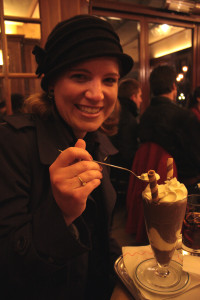
Eating gelato in Venice on Thanksgiving Day
A friend of mine whose had some pretty sad experiences over the holidays, ranging from ending her marriage one year to losing her mother to cancer another, told me recently she was making her home into a “holiday-free zone.” “No turkeys, Christmas trees, or mistletoe are getting into this house,” she proclaimed.
I regret to say I fully understand. I haven’t exactly had the best run on Thanksgiving/Christmas seasons myself. Long married to a man who eschewed much celebration of Christmas because it reminded him too much of being tugged back and forth between divorced parents as a child and having long been a member of a dysfunctional family extraordinaire (i.e. relatives who can sit at the same dinner table for an hour or more and never make eye contact much less speak), the holidays often seem to me more like something to “get through” than to enjoy.
The last couple of years I’ve found creative ways to escape the holidays. I spent Thanksgiving 2011 in Venice, Italy, where there was not a sign anywhere that Americans across the Atlantic were gathering around extended dining room tables carving succulent birds and spooning cranberries onto the fine china that’s pulled out only twice a year. And Christmas 2012, I was so desperate to escape family drama, I opted for taking my daughter to Disney World as an excuse for not showing up to the holiday dinner table.
So far my daughter hasn’t minded…or at least hasn’t noticed. But I wonder sometimes if that’s because she just hasn’t had much experience with the Norman Rockwell version of Christmas. And honestly, do any of us? At least since passing the age of 12 when we started to notice that maybe our aunts and uncles really weren’t that fond of one another and that Grandma so-and-so hadn’t spoken to her son’s wife in five years?
Another friend has troubles at Christmas because her mother can’t bear to be in the same room with her father. They are divorced but can’t make nice even for a day. And honestly, why should they have to? How is it the holidays have become this obligatory family-free-for-all, where if the relatives aren’t engaging in shouting matches over some 20-year-old spat, they are at least sitting there sullenly wishing they were home instead watching football or reading a good book?
I have some acquaintances who hold what they term “a dysfunctional Thanksgiving.” It’s a gathering of friends, not family, over a prodigious feast and is open to anyone who would rather be there than at a family dinner table. Not surprisingly, it draws quite a crowd.
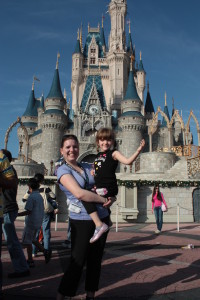
Christmas at Disney World
I haven’t decided yet how I’m going to establish my own version of a “holiday-free zone” this year. Granted I’ve already started putting up a few Christmas wreaths here and there (though I’m truly debating whether or not to drag the 9 ft. tall artificial fir tree out of the basement and spend 6 hours decorating it while stepping precariously from step ladder to step ladder).
I might just send my daughter off to spend Thanksgiving with her father’s dysfunctional family and curl up in front of the fire with a cup of hot cocoa and a good book. As for Christmas, I found myself eyeing some winter trips to Austria and Germany that, as luck would have it, fall right over December 25.
And in an effort to avoid the over-the-top Christmas cheer already showing up in shopping malls and department stores, I think I’ve figured out a way to order all my gifts online and have them delivered to my doorstep…or someone else’s. Heck, with any luck, I might even be able to avoid wrapping paper, ribbons, and Scotch tape.
Though to be quite honest, it’s not the decorations that get to me so much or even the hours and hours of gift wrapping. It’s the childhood memories of traditions that will never be again that often make my Christmas blue.
I know my grandmother, who now lives in a nursing home and is suffering from Alzheimer’s, will no longer oversee my creation of Lemon Cloud. Nor will I ever watch her and my mother roll out dough for flatbread and lefse anymore. Dad and I will never sit together competing over who can make the most elaborate bow to plunk on a gift, and I’ll never climb into bed with my giggling cousins and store contraband soda pop in frosted bedroom windows for midnight snack.
And in the midst of all that loss, I struggle with how to shape the holidays for my daughter, wondering if I would even be doing her any favors by trying to recreate the holidays I thought I knew as a child, holidays where my parents and grandparents may have felt just as displaced as I do now.
Perhaps, in the end, it’s better to scoop her off on a Christmas Caribbean vacation or to spend Thanksgiving reading books in front of the fire. These are traditions that can keep going and going, that don’t require loads of extended family, that don’t rely on rituals that will die when the grandparents die, and where the holiday décor and baking isn’t associated with a sense of loss.
Because I don’t want Heidi feeling one day, as I do now, that January 2 cannot get here fast enough. No, I want her to feel confident in celebrating the joys of the season without the guilt-ridden obligations of family or the sense that her life is somehow inadequate if it doesn’t include a spouse, two kids, and a dog.
Posted by Deborah Huso on Nov 11, 2013 in
Motherhood,
Mothers and Daughters 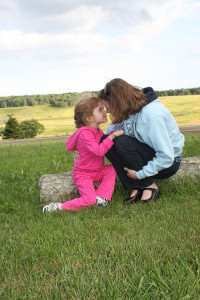
Me with the object of my mother love
My dad often tells me I am a lot like my maternal grandfather. That may seem a strange thing, but my dad loved his father-in-law, probably more than my grandfather’s own children loved him. “I missed him for years after he died,” Dad tells me every so often.
So did I. I still do.
I was not quite six years old when he died, but he was like glistening sunshine to me. Lanky and energetic, he smoked a blue streak. To this day, I get lonesome for him when I smell Lucky Strikes. He drank coffee by the gallons, walked fast, dreamed big, worked hard. He wasn’t perfect. I know he had a firecracker temper. But for me, at five, he was the man who scooped me up into his lap and taught me to butter Norwegian flatbread, called me “Grandpa’s cocklebur,” and took me for rides in his big Case tractor, played with me on the floor, put together my doll carriages, held me in his arms while watching football.
His love was big; so was mine.
Because of him, because of my grandmother (his wife), my dad, and later, my dearest friends, I know what love looks like. It is full on, vulnerable, brave, beautiful, self-sacrificing, and wild. It is “no matter what.” And it lives through fear, and anger, and disappointment.
It is not the kind of love I ever knew from my mother, and that is a hard thing in a world where mother love is celebrated as the greatest love there is.
My mother taught me many things when I was a child—to think for myself, not to follow the herd, to stand up for what I believed in, to do my best. But, contrary to popular notions of motherhood, she was not the one who taught me love.
And it’s okay.
Not that it always feels okay. But rationally, it’s okay. I receive my “mother love” from nearly a dozen other sources. From the women friends who text me in my lowest moments and tell me I am “an awesome person, mother, and friend.” From the mother of my childhood best friend who has half adopted me and told me she will always be there for me. Even from my own daughter, only six, who wraps soft arms around my neck, plants wet kisses on my cheek and says, “I will always love you, Mommy, and always take care of you.”
My daughter is, in the end, the true measure of my mother love. In many ways, my mother no more approves of her than she does of me. Heidi is, in her view, too opinionated, too vocal, too willful, too brave. She asks me about Heidi’s academics, wants to know if she is the smartest kid in class, wonders why I don’t push her harder.
And it’s simple. That’s not my way. My love is different, not wrong, but different. I don’t care if Heidi is the smartest, the most talented, the loveliest. I do care, however, if she is kind, loving, generous. When I attended my most recent conference with Heidi’s teacher, my heart swelled when I heard my daughter made everyone laugh, made people happy, made her peers, especially the new kid in school, feel welcome.
Because my life experience has taught me one can indeed get a fair distance in the working world with smarts and drive. But getting somewhere in life…that’s about love. And Heidi overflows with it.
When I tackle her in a hug and send her to the floor in kisses and tickles until she is squealing with delight, my mother will frown at the noise and fuss that no one is helping her make Christmas dinner. My dad, however, will peek around the corner with a grin and say with mock sternness, “What’s going on in here?”
Love.
That’s what’s going on.
Mother love. And you don’t have to be a mother to give it. Or perfect to receive it. One day, I know, my little girl will grow up to be the kind of woman that people miss for years after she is gone…the way I miss my grandfather. Who loved loud, and hard, and big.
Posted by Mollie Bryan on Oct 3, 2013 in
Men,
Motherhood,
Mothers and Daughters,
Success Guide I’m not the world’s best housekeeper. As you can imagine, living in a small house makes it even more of a challenge. When you need to put things away, where do you put them exactly? Under the bed? Squeezed between some furniture? How about one of those nifty pretty storages boxes? Wait. Where will you put the pretty box holding your stuff?
It doesn’t help that my husband is as much of a slob as I am. He’d rather be reading than doing anything else, so he reads in his free time, rather than pick up his socks from the bathroom floor.
Would I rather be reading or cleaning? I’d rather be reading. Better yet, I’d rather be writing my novels. It’s much easier to live in my fantasy world than to open the door to either one of my daughter’s bedrooms and carry on as if the piles of clothes and books don’t really matter. It shouldn’t bother me, I tell myself, the rest of the house is pretty untidy, too. But at least I can walk across the floors in the rest of the house. (A good thing, don’t you think?) Not so in my daughters’ rooms.
Sometimes I do try to pick up and keep things clean—but I’m not sure anybody really notices what I do—unless I perform the task in front of them.
For example, the other day my husband was surprised that I laundered a load of towels. “Do you think the clean towels just fill the hallway closet on their own?” I asked. So I try to do my housework in front of everybody when I can, with as much moaning and sighing as I can muster. “Look at me, I’m folding the laundry!”
But seriously, this was not an issue in our lives until I decided to stay at home with our children and freelance. Before children, my husband and I lived in the D.C. area, and I worked outside of the house as an editor. We divided chores much more equitably—when we actually did the household chores. We didn’t keep up easily because we were too busy bookstore hopping, going to concerts and readings, and eating out to worry about a clean house. Ahhhh, those were the days.
It’s really been a struggle for me to justify not doing the housework every day when I’m home all day long. But it’s not as if I’m eating bon-bons and watching TV. I’m actually writing books. And blogs. And proposals. And so on.
But the sad truth is most people have some sort of lala-land image about what I do, as if writing isn’t working, as if writing is nothing but joy and happiness and money coming in by the droves. And yes, even my own husband of almost 23 years has a hard time with this concept. From his point of view, if I’m not making money, it’s not a job. He has a point.
I am making money with my writing, even though it’s not enough that if I were alone on this planet without a spouse, I could earn a living by penning my novels. No way. Maybe I could do it with freelancing, but then I’d have to give up writing books because freelancing deadlines are tighter and must be met if you want to keep working. The kind of a novel you could squeeze in between the deadlines of another kind of writing might not be a very good novel. Or even a very good idea of a novel. Novels take long tracks of uninterrupted time.
Okay. Seems I’ve gotten sidetracked, away from my original subject, which was housekeeping. You see how easy that is for me—to just forget about it?
Right this minute I’m thinking “Just step away from the keyboard and put a load of towels in the washer.” But the very next minute my thoughts progress to the next sentence on my computer screen and how I’m going to finish this blog post in time for my deadline. Next, of course, I think about my next book and that’s where my thoughts always lead me—which is a good thing because that due date is looming, too.
In the meantime, I’m not sure how important a clean house is to the happiness of my family. And thank goodness for that. I’d much rather spend quality time with them than nag at them to clean or to be cleaning the house myself. While trying to keep the house passable, at least, I try to keep the bigger picture in mind. In the words of the wise-cracking Phyllis Diller, “Cleaning your house while your kids are still growing is like shoveling the sidewalk before it stops snowing.”
Posted by Mollie Bryan on Sep 15, 2013 in
Motherhood,
Mothers and Daughters In the midst of the craziness of day-to-day parenting, sometimes we have moments that force us to pause and experience some strange mix of awe and gut-wrenching fear. A couple of weeks ago, I had one of those moments as I sent my oldest daughter off on the bus for our school district’s “Transitions” program.
Emma, you see, is heading to high school. Those words cycle through my brain and strike a numb feeling across my chest, as if I have just lost my breath. Then I take a deep one. Exhale. We’ve made it this far.
Oddly enough, it reminded me of the time a friend handed me a photo of Emma in her dancing costume years ago. I gasped. I wanted to say, “Wait, there’s been a mistake. That’s not my daughter.” But it was. She was beautiful in her blue costume and tutu, kneeling, hands crossed, one shoulder lifted, as if to hint at the joy of being a little girl. A big smile spread across her little face. Shades of the woman she might be someday.
I hardly recognized her.
When I think of Emma, then five, I think of her thick mane of strawberry blonde hair tussled and blowing freely as she ran and bounced around. Hair that I brushed into a shining golden beauty, which lasted about two seconds. I think of her dirty face that I washed eight or nine times a day. Her teeth that I was constantly after her to brush, her hard-to-keep-clipped, let alone clean, finger nails. She was the wind and the earth all wrapped into a big, messy wonderful little person. So to see this other version of Emma, perfectly coiffed, startled me.
And in some ways she is still more wind and earth than perfectly polished at age fourteen. I only see traces of that girl now. She is somewhere in-between, slipping through my fingers one minute. The next she is crawling into bed with me to cuddle.
These days she is more concerned with her appearance. I don’t have to “make” her brush her teeth or her hair. She sits in front of the mirror for long periods of time, primping.
Of course, she is so much more than what she looks like. I want her to know that. I want her to celebrate who she is every day even though I know that is an optimistic order in today’s world. I want it so much for both of my girls. But I guess I worry about it more in Emma. She is my sensitive one. There’s not a mean bone in her body. When her sister Tess used to take swats at her, Emma ran to me and hid behind me. She has veiled this characteristic with a tough girl attitude all the way through middle school. But I know her native sweetness is in there, underneath the skinny jeans and combat boots.
And so I worry about what the world will do to my oldest daughter. I think about it every day, more and more, with each step she takes. I try to point out to her that it is a good thing to be sensitive and nurturing, but we need to be careful where we place our hearts. I think she understands—well, as much as a fourteen-year-old can.
For some, high school is the pinnacle of our lives, shaping us in ways we try not to think about. For me, an outsider in high school, I couldn’t wait to finish, leave the area, and get started with my life elsewhere. But in many ways, I’m still an outsider. I struggle to find my place on the planet after years of painful letdowns and broken hearts. I’ve donned my tough-girl attitude to make it through rocky times as well.
I see shades of myself in E. It can be hard to see yourself in your children—they are almost like little mirrors, giving glimpses of ourselves as we struggle to understand it all.
I used to think the toddler days were like the Olympics of parenting —days of runny noses and diapers and poop on the floor and one more cup of milk, and, God help me, macaroni and cheese again for dinner. So many days I thought, if I can just get through this, it will be okay. Tomorrow will be easier.
I’ve reached one of my tomorrows. Is it simpler? In a way, it is, in that Emma pretty much takes care of her physical self. I am no longer responsible for brushing her teeth and unruly hair, for example, and I don’t have to worry about her sticking an electrical cord in her mouth. Or something. But I can’t afford the lull of a false sense of security now that she’s a bit older. The dangers and heartaches are still there—prevalent—but in a very different way.
Sometimes I’m excited for her and confident that she will be fine. We will be fine. We will get through shopping for the proms and homecoming dressess, the heartaches and the joys of dating, and the academics and everything that goes with that. We will be fine. Other times, I’ll ignore my racing heart, my feeling that time is slipping away too fast, and simply try not to panic.
But then again, just yesterday Emma asked me if she could put petroleum jelly in her ears because they felt itchy. “No,” I said. “Don’t put anything in your ears!” I think it’s safe to say she’ll be needing me for many years to come.
Posted by Mollie Bryan on Jul 15, 2013 in
Men,
Motherhood,
Mothers and Daughters,
Relationships “What a circus act we women perform every day of our lives. Look at us. We run a tightrope daily, balancing a pile of books on the head. Baby-carriage, parasol, kitchen chair, still under control. Steady now! This is not the life of simplicity but the life of multiplicity that the wise men warn us of. It leads not to unification but to fragmentation. It does not bring us grace; it destroys the soul.”—Ann Morrow Lindbergh
A simpler way of putting this would be “Honey, I love you, but get the eff out of my space. You’re destroying my soul.”
Okay, maybe that’s just my interpretation.
When I thought about my efforts, as a writer, to create a home office, a space for myself, I thought about that quote from Virginia Woolf. You know–the one about women writers needing a room of their own. How lovely. How romantic. But it simply didn’t work for me. It didn’t have the right flavor and feel for my more Erma Bombeck-ish life.
Unfortunately, I found no quotes from her about etching out space and time to write while mothering, taking care of her house, and so on. She was probably too busy living that reality to really think, let alone write about it.
Come to think of it, I don’t read much Erma Bombeck these days because if I want to read about dirty houses, piles of laundry, and the ups and downs of family life, well, this is my reality and I lost the fascination with my “exciting” domestic life years ago.
But I do keep Anne Morrow Lindbergh’s famous book Gift from the Sea close at hand. She inspired many women in her generation to follow their dreams and gave a voice to their emotions and struggles. She also struggled to maintain her own identity–both literary and personal–in the immense shadow of her husband, Charles.
She was a mother and a well-respected writer. Her “circus act,” of course, was probably helped by the fact that she was wealthy. She probably had nannies for her children, maybe a few maids.
Most women writers don’t have that option. And for most of us, writing is more than a trade—it is a compulsion and a passion. So when you don’t have the time to write because say your children are taking up most of it, it’s not only a professional but also a deep personal sacrifice.
My husband and I purchased our three-bedroom home 14 years ago. With one baby, 1,400-square feet seemed plenty. One bedroom for each of us and an extra room for an office. That lasted about a year—or until we knew another baby was on the way.
Then I moved my desk into the dining room, where it stayed for awhile. I remember slipping Emma in the baby bouncer and dashing off a quick column or article to my editor to the bounce-bounce-bounce rhythms of the contraption. I also remember trying out the playpen and a dog fence while I worked and Emma played. As wily then as she is now, she eventually escaped.
And she stopped napping when she was about 18 months old. So working during naptimes wasn’t much of an option for me either.
The next step in my quest for workspace was a groovy desk/armoire in the living room, where I could work and sort of watch over both girls playing. We could close the doors on my computer and papers so the girls wouldn’t mess with them, and we could have some semblance of a normal living space when people visited.
In the meantime, we had decided to turn our sun porch into an office for me, with a little space for my husband, who, after all, has a rather large office where he works. Renovating the sun porch was no easy task. Between our lack of time (toddlers) and dwindling funds (one-income household, basically, with an unsteady freelance income on my end), it became an issue of a physical, financial, and time balance in our household. I remember a vivid conversation with an editor while I was in the middle of painting the walls. Finally, there was heat, flooring, and even lovely pond-moss green walls.
But as we finished the room, I began to worry. My husband liked it too much and was becoming enamored by this private room of many windows, books, and music. There was a gleam in his eye as he looked over my space. Okay, I told myself, hey, he’s worked on this room, too, and he works at an office, so he won’t spend A LOT of time in here, right? This was just another one of those compromises in a long marriage full of them. I’ve had to fight softly to maintain my space to write and think.
Well, at this point, a few years later, the office is the room he spends the most time in on the weekends and in the evenings. He loves it and now has a huge rocking chair in the corner where he sits and listens to music on his headphones. Every time I step around that chair to get to my desk, I think one word: yurt. Yep. you read that right. I am now longing for a backyard yurt.
You see, it’s not just him, but also my daughters who have taken a shine to my office. Many times, we are all crammed in the office together—the smallest room in the house. And I am not writing. It’s such a nice space that the whole family gathers there. This is a problem. In my quest for space to work, I find it’s also a search for acceptance and acknowledgement that my writing matters in my own house, to my family, as well as to the outside world.
So I eek out my space. However I can. And I won’t give up.
Sometimes the guilt sets in, and I adjust my writing schedule and tell myself I don’t need to be working when my family is home. On the other hand, when I’m on deadline or have an important phone or Skype meeting or interview, I give them fair warning. The door will be closed.
Sometimes my balancing act veers to one side or the other. Sometimes I spend way too much time writing and lift my head and wonder what the hell is going on in my own house. Doesn’t anybody else know how to unload the dishwasher? Other times, I’m on top of the house and the family schedule, and my writing suffers. Did I really send that to my editor?
This summer my balancing act is working by getting up earlier than the rest of the family so that I can write in peace. It doesn’t always work out. Even as I write this at 5:38 am, my husband is in his rocking chair, reading, and he just let loose with a loud sneeze. “Bless you,” I say. But what I’m really thinking is “Yurt.”

Making dreams real with some fireworks and electric sparks at Cinderella’s castle
I often wonder how many of us have been screwed up by Norman Rockwell paintings…like the famous family Thanksgiving picture with all the smiling faces, multiple generations gathered around the holiday dinner table. If our holiday dinners don’t look this way (which they rarely do unless you can convince a dozen cranky people to fake it really hard), we get depressed, believe ourselves failures at life (or at least family life), and fall into funks from which the typical American rescue is a bottle of Lexapro…or maybe Wild Turkey. (Depends on the family.)
Norman Rockwell meant well, I think. As did Walt Disney when he began building the famous theme parks that draw families by the millions each year. I doubt it was the intent of either to set up unrealistic expectations of joy to which we relentlessly aspire with very little real hope of attainment. Yet that is what they have done.
I attempted the Disney dream with my five-year-old daughter this Christmas. It was, in part, an attempt to escape the family holiday dinner table with all its barely suppressed tension and disappointment in exchange for a Christmas that looked nothing like Christmas, nothing like a Norman Rockwell painting, nothing like anything that could possibly make me compare my life to a dream I can’t say as I’ve seen anyone I know fully attain.
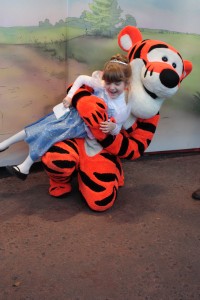
My daughter clowning around with Tigger at the Magic Kingdom
And besides, we all grow up with visions of Disney World as a magical place filled with fun, and joy, and laughter. Where these visions come from, I don’t know. I think they’re from the same place that sends visions of early parenthood as some period of deep happiness where Mom and Dad share the delightful responsibility of changing diarrhea-laden diapers at 3 a.m. and manage to smile through the whole smelly, sleep-deprived process.
So many parents with whom I was acquainted had encouraged me to take Heidi to Disney, insisted now was the time while she would still think all the princesses and residents of the Hundred Acre Wood were real. And I’d seen their Facebook posts and pictures of their own Disney trips, and somehow, I admit, I was taken in.
But once I began reading the 700+ page, Bible-thick Unofficial Guide to Disney and downloaded all its suggested apps, I began to worry. This was like planning battle strategy—hit this ride at this time to avoid a 180-minute wait. Get a Fastpass for Dumbo, and then go see the Mickey Philharmonic, and make sure to be back at your designated time for your 30-second ride aboard the floating elephant.
Don’t get me wrong. My five-year-old had a blast. And thank heaven for that. Else I would find it incredibly hard to justify the 25 miles or so I walked on hard pavement day after day pushing a Minnie Mouse stroller designed for short parents, carrying a 30-pound backpack, while plotting Magic Kingdom battle tactics on my Droid.
At first, I thought maybe I was a grumpy parent, that something was wrong with me. Why was I not loving Disney??? It was the same line of questioning I engaged in as the mother of a newborn. Why don’t I love every minute of the smelly diapers, the breast milk vomit on my shoulder, the 48-hour marathon runs of screaming diaper rash?
When I began berating myself over the phone to a friend, he said, “You do realize all those other parents hate it as much you, right?”
Um, no, I didn’t realize that. If that’s the case, why do millions of people descend on the park every year?
Because they’re buying into the Disney dream…in the same way we buy into the American Dream. Get everything you want, and then you’ll be happy. Make a wish, throw some electric sparkles into the air, and everything will be perfect ,and the wicked witch or Captain Hook will run away.

One dream come true: a grateful five-year-old
Don’t get me wrong. I believe in dreams, probably more so than the average person who has had the intelligence to give up on the impossible before divorcing twice and switching jobs about a dozen times. But Disney isn’t really about dreams, at least not the kind that are achievable when you make less than $1 billion a year. All Walt Disney has proved is that if you throw enough hard cash at something, you really can make the impossible real. Bill Gates and Steve Jobs have done the same thing with a lot less plastic and electric hoopla.
And after a few days at Disney and a fair amount of eavesdropping as well as philosophical chats with parents stuck in the same two-hour line with me waiting for photos with Princess Merida, I began to see that I was not alone in wanting this active vacation for couch potatoes to end as soon as possible.
While walking down a beautifully manicured path in the Animal Kingdom, I overheard a mother say to her teenage daughter, “I haven’t been here in 10 years, and I don’t think I’ll be back for at least another 10.” Dragging her feet and sighing, she continued, “This place is a mess.” (She was referring to the crowds and the spectacle, mind you, not the trash. Disney hires a massive cadre of folks who spend their days sweeping up every scrap of paper and displaced water bottle within three seconds of them hitting the ground.)
I found myself commiserating with mothers pushing baby strollers who wanted nothing more than to get back home to Nashville…and London (and why would you fly across the Atlantic to see this place???) I listened to fathers snap at their sons, “Enough already. No more whining, no more talking, just be quiet.” I heard moms and dads bickering on the ferry boat departing the Magic Kingdom, perfect fireworks blasting off in the background over Cinderella’s Castle. But was anyone watching them? No, just Heidi and me. Everyone else was facing the exit sign for the ferry, anxious to get off, get home, and put the Disney dream behind them.
My ex-husband told me I should take Heidi here again one day, maybe when she is 21, to let her “relive the magic.” I actually guffawed. If my daughter can think of nothing better to do with her 21st birthday than go to the plastic kingdom, I have done a poor job of raising her. African safari, kayaking Norwegian fjords, hiking the Great Wall—any of these requests I’m willing to consider. But not Disney World. Never again.
You see, I’m all about magic…real magic. The kind you find when rafting down real whitewater on the New or Colorado Rivers, not some fake river flowing through the Animal Kingdom.
It might have been worth it to see Heidi dance with Tigger in full delight or wrap her arms around Minnie Mouse’s waist. But you know what? She was just as thrilled last fall standing under the largest intact T-Rex skeleton in the world at the Field Museum in Chicago and posing in front of a giant Brontosaurus’ thigh bone.
But the really tough thing about Disney is the way it distracts. It distracts so intensely that the families visiting forget everything but checking off all the rides on their list and getting the autographs of all the “characters” for their six-year-old. It’s not like gliding into Glacier Bay on a kayak or slipping down the canals of Venice on a gondola where you experience take your breath away spectacle of an all-engrossing, thank God I’m alive and breathing and seeing this kind.
By my last night at Disney, I’d had quite enough. Tired and cranky as a toddler, I was trying to push Heidi’s stroller through a mob scene watching the nightly Electrical Parade at the Magic Kingdom. When a “cast member” chastised me for stopping the flow of traffic so my little one could get one last glimpse of Mickey gliding by on a float, I turned on her with all my Disney angst and let loose a flood of not epithets but something close. Needless to say, she left me alone, and I knew suddenly Disney was not the place for me anymore than a cage in a make-believe Serengeti is any place for a warthog.
I still don’t plan on spending Christmas anytime soon trying to create a Norman Rockwell painting in my dining room…but I sure as heck won’t be watching pacing tigers in “Asia” who are trying to figure out how to break through the glass wall that separates them from the tourists they’d very much like to eat. I’d rather see the tigers where they belong…in India…and myself where I belong, too—in a setting where magic is real and doesn’t require an electrical cord to make it run.
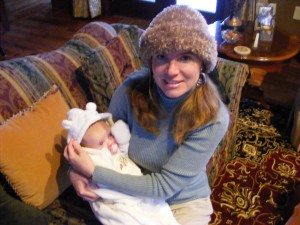
Two months into new motherhood: recognize that “deer caught in the headlights” look?
It was almost like I was meant to read Mel Robbins’ column in the August issue of SUCCESS magazine. It was the night before my (ex)husband and I were to finally sign the separation agreement that would formally end our association as husband and wife and dissolve any claims we might have on one another. It was 11 p.m. I picked up the magazine there on the ottoman, flipped through it, and landed on Robbins’ essay,
“Fight For Your Happiness.”
I wouldn’t say I needed to read Robbins’ column that night. My days and nights of soul searching were long passed. In fact, they had passed a good six months before I even asked my husband for a divorce. But her essay verified for me what few people, particularly unhappily married ones, are willing to acknowledge—that holding a doomed relationship together for the sake of the kids is…well…perhaps among the worst things you could do to your children.
I wasn’t having any cold feet, mind you. But sometimes it helps to know you’re not a lone wolf in the wilderness. In her column, Robbins talks about a close friend who decided to leave her marriage of 23 years. The friend’s announcement came as a shock. As Robbins points out, the couple had highly successful careers, three children, a beautiful home, took fantastic vacations together, and had lots of money. Their life was perfect…or, as is so often the case, it appeared so.
Robbins notes of her friend, “Inside, Lisa felt miserable. She and her husband had become roommates—they hadn’t touched one another in years. She laughed less and less. She gained 30 pounds.” The only thing they had left in common, Robbins says, was their three children.
So the two decided to divorce, and their kids said, “Now everything makes sense.”

Our first getaway after Heidi’s birth…and the last photo where the smiles are real.
What struck me about “Lisa’s story” was how similar it was to my own and how similar it is to that of so many people I care about. While some might read Robbins’ essay, which encourages readers to make the hard changes that ultimately lead to joy, as a call to action, I read it as a cry for honesty.
We may laugh about the old adage of “keeping up with the Joneses.” But most of us do it even as we recognize we’re doing it. The big question here is: WHY?
I’m not sure I have the answer. I’m no better than the average–I probably hung onto my marriage years longer than I should have. I recognized it was moving onto the rocks even before my daughter was born, and there’s nothing like bringing a child into the world to make a rocky coast even more treacherous. I’ll never forget our first Thanksgiving after Heidi’s birth. She was two months old, and my best friend, who was single at the time, joined us for the holiday. After we’d cleaned up dishes from the noon meal, she said to me, “I want to have a happy little family just like yours, Debbie.”
Full in the throes of postpartum depression, a newborn on my hip, my business running at full throttle, and my active duty Navy husband rarely in the picture, I was floored by her statement. I was at one of the lowest lows in my life.

A moment of “for the camera” bliss on the Cayman Islands.
I failed to notice, however, that to anyone on the outside looking in, my life looked grand. A year earlier, I had completed construction of my dream house following marriage to my high school sweetheart. My business was growing by leaps and bounds, gross income doubling every year. Things were so good, in fact, that eight months after Heidi’s birth, her dad retired from the military, and we lived secure in the fact that we could more than manage on one income. To celebrate his retirement and the newfound freedom of our lives, he and I left Heidi with the grandparents for three weeks and went on a luxurious nearly month-long vacation—a week in the Florida Keys, a week in the Caribbean, and a week lounging around on Sanibel Island. We would follow that up two years later with a trip through Northern Europe, and every October, we rented a house on the northern Outer Banks for a week in celebration of Heidi’s birthday.
This was life at its very best, yes?
Hardly.
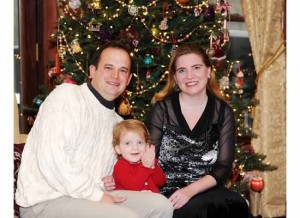
The “perfect” family Christmas portrait.
As is so often the case, what is visible on the surface is hardly indicative of what lies beneath. Behind all the smiling photographs of a perfect family life, things were not so wonderful. Today I look at professional photographs from the Christmas after Heidi turned two and am amazed at the happy expressions on my face…on my husband’s face. As I finished dressing into black velvet for the occasion, he told me he wasn’t going to participate in the photo shoot because it was a farce. And he was right. It was. He and I were no more in love at that point than a cow is happy to eat a patch of crown vetch. But I finally convinced him to play the game. The result? Falsely blissful Christmas photos for posterity.
If this sounds familiar, just wait. It gets better.
When I complained, about two years after Heidi’s birth, about the wreck of my marriage to a close friend, she puzzled over what to do. She believed, the child of divorced parents herself, that maintaining the family unit was critical. After a few moments of consideration, she said, “Have you considered having an affair?”
Had it indeed come to this?
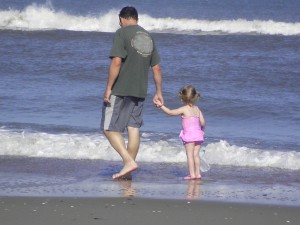
Heidi and her dad during the family’s annual birthday beach getaway.
Yes, it had. And I spent the next two years of my life trying to decide if I was doing my daughter any favors by maintaining a marriage with a man I no longer loved.
Because what I had to consider was whether or not it made a difference if my husband and I rarely showed affection in front of Heidi, whether or not it mattered if family dinners were typically strained and difficult, whether or not my daughter would adopt all of this lack of intimacy and tenderness between her parents as a confirmation of its “normalcy.” Did I want her to grow up and settle? To say to herself “Well, I guess this is how love is; I guess this is what marriage looks like.”
Was it going to benefit my daughter for me to “fake it” with her dad for the next 12 to 15 years?
I ultimately decided the answer to that question was a resounding “no.”
I had decided that the best things I could give my daughter were my honesty and my happiness. And if I gave her those two things, it would likely also increase my chances of finding love that was real…because I was about to be real, to stop the charade of the perfect life I’d been carrying on, well, since early adulthood at least.
And what does real love look like? Well, as a friend of mine said recently, “Real love sure as hell isn’t something you can clock in or clock out of.”

Honest joy at last: On the Skydeck in Chicago with my daughter one year after “the end”
Yet that’s exactly what my ex and I had done. And it’s what thousands of other couples do every day, denying each other intimacy because it’s inconvenient, because they’re busy, because they’re hurting and don’t want to hurt anymore, because they’re afraid. So they give and receive love when it’s comfortable and deny its dispensation and acceptance when it’s not. And eventually, love is gone completely…if it ever really existed in the first place…because it has lived like a houseplant that everyone keeps forgetting to water regularly.
And when a relationship reaches that point of dryness and wilt, it’s typically very hard to save.
But that doesn’t mean one has to give up and settle for a life that looks perfect but sure as hell isn’t. As “Lisa” discovered, you can always choose happiness. And you might even find yourself surprised by how that choice our culture so often deems selfish (probably because so much of the culture lives with its absence and so must justify it) changes not only you…but the people you love.
The same friend who cautioned me against the dangers of “clocking in and clocking out” on love has had no easy ride in this life, but, as Robbins noted in her essay, happiness is not always the easiest choice to make. Sometimes you have to fight for it. My friend did, and he lives by his own special creed on this one: “If I have lived my life without happiness, I have lived it in vain.”

One of my best holiday memories: Thanksgiving with my oldest friend and chosen “sister”
As I write this, people everywhere are suffering. Even among my small circle of acquaintance, the trouble is great. One of my colleagues is watching his life partner, who was first diagnosed with breast cancer, now struggle with cancer in her bones, lungs, liver, and abdominal cavity. Another friend is watching an old school friend fight for his life to recover from cardiac surgery. Meanwhile a dear friend’s boss and his wife try to cope with the loss of a child, and one of my clients is about to see her husband go into surgery tomorrow to remove a cancerous tumor from his kidney.
This is just the tip of the iceberg.
My oldest and dearest friend and I talk almost daily about the trouble in this world, how a day does not seem to go by where someone we know and care about is not struggling. And we talk, too, about why life has to be this way, why it seems to get more and more heartbreaking the older we get.
We are in our mid-30s, part of that unenviable “sandwich” generation, caring for young children, caring for ailing, aging parents, watching our friends and acquaintances struggle with their first signs of the onset of deteriorating bodies and lives. Illness, death, infidelity, divorce, births, neuroses—we are watching it all like a grand drama here in our own lives.
It is hard sometimes not to feel hopeless.
“I think it’s only going to get worse,” Sarah confides to me one night.
“I think you’re right,” I agree, realizing that despite everything we’ve been led to believe, life does not get easier with age and wisdom.
When she tells me about one of her friends who just lost her mother and sister in the last year, then struggled with her husband being in the ICU on the brink of death for weeks, only to lose a son in a car accident shortly after her husband came home, I tell her, “She should write a book.”
“About what?” Sarah asks.
“About how she has survived it,” I reply, thinking I would surely drive my car into a tree if so much tragedy befell me at once.
“Her women friends,” Sarah tells me. “That’s how she says she has gotten through.”
It might strike some people as odd that the woman did not say her family had pulled her through, so enamored are we as a culture with the idea that families are the be all and end all of existence. But that, as I and many of my women friends know, is, more often than not, a tragic myth.
Years ago, a couple I knew lost a son who was in the military. Always the loving pair with a big happy family (they had three other children) to outside eyes, this death tore them to pieces. One grieved with tears and talking; the other withdrew. They did not understand one another. Their more than two-decade old marriage dissolved within the year.
Why do families so often fail at love in the most critical of times?
It is a question to which I do not have the answer, though I have seen it often in my own life and in the lives of the people I love most dearly in this world.
Mark Twain once quipped that “familiarity breeds contempt,” and that may be true to some degree. But perhaps the greater truth is that the loving family that stands by us through thick and thin is as much a myth as Prince Charming and “happily ever after.” Yet we buy into it nevertheless, wondering what is wrong with us when our spouses, children, parents, aunts and uncles don’t provide the succor we need in times of crisis.
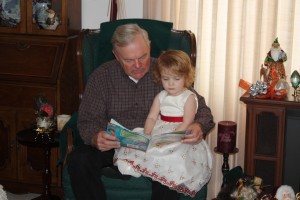
Taking a break from the dysfunctional family Christmas: my dad and Heidi
An acquaintance mentioned to me recently how his parents had this grand idea of having a summer family get-together where everyone stayed in a rented vacation house for a week—parents, kids, grandparents, sisters, brothers…everyone. “They think it’s going to be some big happy family,” he remarked. “But it’s never been that way, and it won’t be this time either. That’s just not how we roll.”
I don’t know if it’s how anyone rolls, to be quite honest.
We don’t choose our families, not really. We may get to choose our spouses, but most of us are so young and stupid when we do that that we might as well be picking out the cutest puppy at the pet shop on a whim of temporary adoration. It’s difficult to ask people whom we have not chosen and who have not chosen us to give us their all. Maybe they don’t like us. Maybe we don’t like them.
The old saying goes, “Blood is thicker than water.” I don’t know if that’s true. When one of my friends tells me my mother is crazy, I reply, “Yep, you’re right.”
And then I thank heaven for my friends. If I had to rely on my family to get me through the tough times, I’d be in dire shape.
Ironically though, it is with our disgruntled families that most of us spend our precious free hours—our vacations, holidays, birthdays. What should be the happiest days of our lives are peppered with disappointment, disillusionment, and sometimes even verbal brawls because we try to impose our vision of “the family” onto a group of people who maybe really don’t have a damn thing in common other than a blood line.
I know a handful of people who have made a stand against the drama. One couple I know who found each other late in life skip the family drama entirely for the holidays and have all their close friends over for Christmas dinner instead. I also have some friends that hold a “dysfunctional Thanksgiving”—a gathering of friends who have eschewed their relatives for this iconic American holiday.
I’ve decided it’s high time I do the same. This year I’m skipping Christmas. I have a long history of dysfunctional holidays that I’ve decided it’s high time I put in the past. From relatives who get into tear-inducing fights post-Christmas dinner to stressed out women who cook and bake for days out of obligation instead of love, I’m fed up. I’m taking my daughter to Disney World. And given my low tolerance for mass consumerism and waist-high people, it’s a grand testament to just how fed up I am.
Maybe one day when all the relatives who drive us crazy are gone and we’ve all divorced and remarried to people we actually like, my friends and I will join together for holidays we can actually enjoy among families we have chosen. Until then, do not be surprised to find me on a beach halfway across the world come Christmas and New Year’s…with no blood relative in sight, save perhaps my daughter.
Because life is too short to spend it being miserable among people who no more want to be with us than we want to be with them.














